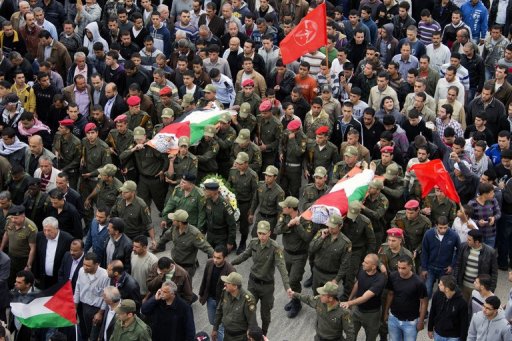
(AFP, Azhar Shallal)
AFP – Dozens of militants died in two days of fighting with counter-terrorism forces in a city west of Iraq’s capital, a security spokesman said, while violence elsewhere Monday killed at least 10 people.
Violence has surged to a level not seen since 2008, when Iraq was just emerging from a brutal period of sectarian killings in which tens of thousands died.
And shifting parts of Anbar provincial capital Ramadi and all of the city of Fallujah, to its east, have been held by anti-government fighters for more than eight weeks.
Sabah Noori, spokesman for Iraq’s Counter-Terrorism Service, said its forces had killed 52 jihadist militants in fighting on Sunday and Monday in Ramadi.
“During an operation to clear areas of Ramadi, our forces were able to kill 52 terrorists” from powerful jihadist group the Islamic State of Iraq and the Levant, Noori said.
The dead included foreign fighters, he said, adding that operations to retake some areas of the city were still ongoing.
The crisis in Anbar province erupted in late December when security forces dismantled Iraq’s main Sunni Arab anti-government protest camp just outside Ramadi.
Anti-government fighters subsequently seized Fallujah and parts of Ramadi.
It is the first time anti-government forces have exercised such open control in major cities since the peak of the deadly violence that followed the US-led invasion of 2003.
More than 370,000 people may have been displaced by violence in Anbar, according to the United Nations.
Violence in other areas of Iraq killed 10 people on Monday.
In the deadliest incident, a mortar round struck a house in Fallujah, killing two women and two children, Dr Ahmed Shami told AFP.
The source of the fire was not immediately clear.
In Baghdad, a bomb exploded in a market, killing one person and wounding five, while gunmen shot dead a policeman in Abu Ghraib, west of the capital.
And attacks in the northern province of Nineveh – one of the most dangerous areas of the country –killed four people, including a lawyer and a policeman.
Iraq is suffering a year-long surge in violence driven by widespread discontent among the minority Sunni Arab community, and by the bloody civil war in neighbouring Syria.
Violence has killed more than 1,740 people since the beginning of the year, according to AFP figures based on security and medical sources.


